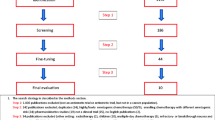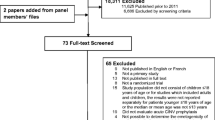Abstract
Goals of the work
To assess whether the addition of midazolam to dexamethasone and granisetron could ameliorate the refractory acute nausea and/or vomiting caused by a highly emetogenic platinum-based chemotherapy.
Patients and methods
Enrolled in the study were 30 consecutive adult patients with refractory acute emesis. Nausea and vomiting were assessed by physicians and graded according to the NCI common toxicity criteria. Nausea was further self-assessed by patients using a visual analogue scale. Statistical analysis was performed by nonparametric tests.
Results
With the introduction of midazolam, 73% of patients had a reduction of at least one grade in nausea and vomiting intensity in comparison with the previous cycle of chemotherapy. From the second cycle, six patients (23%) had complete control of acute vomiting, a benefit that usually persisted in the subsequent cycles. Five more patients achieved complete control of acute vomiting during the third course; this effect persisted in the subsequent courses as well. The average relative reduction in acute nausea and vomiting grade from the first to the second course was 48% (95% CI 34–62%) and 48% (95% CI 31–65%), respectively. A significant difference in acute nausea and vomiting over all the six courses of chemotherapy administered was recorded (Friedman ANOVA, P <0.0001). Comparing each course with any subsequent course, a significant reduction in acute nausea and vomiting was observed between the first and second course, the first and third course, and the first and fourth course.
Conclusions
Our results suggest that midazolam may be a useful adjunct to standard antiemetic drugs for patients receiving highly emetogenic cisplatin-based chemotherapy. A randomized trial is warranted to confirm these results.


Similar content being viewed by others
References
Roila F (2003) MASCC Antiemetic Subcommittee. Multinational Association of Supportive Cancer Care (MASCC). Support Care Cancer 11:260–261
Coates A, Abraham S, Kaye SB, Sowerbutts T, Frewin C, Fox RM, Tattersall MH (1983) On the receiving end—patient perception of the side-effects of cancer chemotherapy. Eur J Cancer Clin Oncol 19:203–208
Cooper S, Georgiou V (1992) The impact of cytotoxic chemotherapy—perspectives from patients, specialists and nurses. Eur J Cancer 28A [Suppl 1]:S36–S38
Hesketh P (1999) Defining the emetogenicity of cancer chemotherapy regimens: relevance to clinical practice. Oncologist 4:191–196
Licitra L, Spinazze S, Roila F (2002) Antiemetic therapy. Crit Rev Oncol Hematol 43:93–101
Laszlo J, Clark RA, Hanson DC, Tyson L, Crumpler L, Gralla R (1985) Lorazepam in cancer patients treated with cisplatin: a drug having antiemetic, amnesic, and anxiolytic effects. J Clin Oncol 3:864–869
Kris MG, Gralla RJ, Clark RA, Tyson LB, Fiore JJ, Kelsen DP, Groshen S (1985) Consecutive dose-finding trials adding lorazepam to the combination of metoclopramide plus dexamethasone: improved subjective effectiveness over the combination of diphenhydramine plus metoclopramide plus dexamethasone. Cancer Treat Rep 69:1257–1262
Di Florio T (1992) The use of midazolam for persistent postoperative nausea and vomiting. Anaesth Intensive Care 20:383–386
Watts JC, Brierly A (2001) Midazolam for management of postoperative nausea. Anaesthesia 56:1129
Phillis JW, Bender AS, Wu PH (1980) Benzodiazepines inhibit adenosine uptake into rat brain synaptosomes. Brain Res 195:494–498
Racke K, Schwore H, Kilbinger H (1995) The pharmacology of 5-HT release from enterochromaffin cells. In: Reynolds WM, Andrews PRL, Davis CJ (eds) Serotonin and the scientific basis of antiemetic therapy. Oxford Clinical Communications, Oxford, pp 84–89
Potanovich LM, Pisters KM, Kris MG, Tyson LB, Clark RA, Baltzer L, Gralla RJ (1991) Midazolam in patients receiving anticancer chemotherapy and antiemetics. J Pain Symptom Manage 8:519–524
Gralla RJ, Osoba D, Kris MG, Kirkbride P, Hesketh PJ, Chinnery LW, Clark-Snow R, Gill DP, Groshen S, Grunberg S, Koeller JM, Morrow GR, Perez EA, Silber JH, Pfister DG (1999) Recommendations for the use of antiemetics: evidence-based, clinical practice guidelines. American Society of Clinical Oncology. J Clin Oncol 17:2971–2994
Aapro MS (2002) How do we manage patients with refractory or breakthrough emesis? Support Care Cancer 10:106–109
Acknowledgements
We thank all patients, Gabriella Cavalleri, Angela Astori, Mary Riccardi and all nurses or our staff, for their important contribution.
Author information
Authors and Affiliations
Corresponding author
Rights and permissions
About this article
Cite this article
Mandalà, M., Cremonesi, M., Rocca, A. et al. Midazolam for acute emesis refractory to dexamethasone and granisetron after highly emetogenic chemotherapy: a phase II study. Support Care Cancer 13, 375–380 (2005). https://doi.org/10.1007/s00520-004-0741-z
Received:
Accepted:
Published:
Issue Date:
DOI: https://doi.org/10.1007/s00520-004-0741-z




